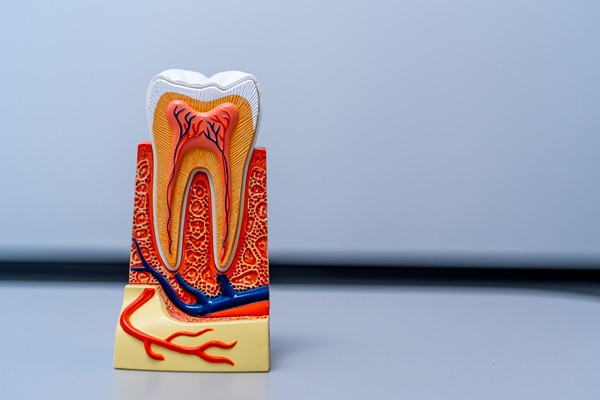Signs You May Need an Emergency Root Canal

Emergency root canals can relieve pain, address infection, and preserve the natural tooth structure whenever possible. While only a dental provider can determine whether this treatment is needed, it is important to know the warning signs that you may need one. That way, you can act fast should you need this tooth-saving treatment from an endodontist.
Understanding emergency root canals
An emergency root canal is a procedure performed to remove infected or inflamed pulp tissue from inside a tooth. It is recommended when decay, trauma, or a deep crack allows bacteria to reach the pulp chamber, causing infection or severe inflammation. Prompt treatment not only addresses immediate discomfort but also reduces the risk of more extensive procedures, such as tooth extraction or bone grafting.
Unlike non-urgent root canals that are scheduled in advance, endodontists can perform emergency procedures on short notice to relieve significant pain and drain (or even prevent) an abscess. However, the process is the same. The endodontist will access the root canals, clean out the infected or inflamed tissue, and seal the tooth to prevent further damage.
Signs you may need an emergency root canal
There are three common symptoms that, when persistent, could indicate the need for an emergency root canal. These include the following:
Intense tooth pain
Severe, lingering tooth pain is one of the most common indicators of an infected pulp. This pain may be spontaneous or triggered by chewing, pressure, or exposure to hot or cold temperatures. It often becomes progressively worse and may radiate to the jaw, ear, or surrounding areas. Sometimes, it feels like a throbbing pain. An emergency root canal can effectively remove the source of pain and restore the tooth's health.
Tooth sensitivity
Heightened tooth sensitivity to temperature can be a problem when it lasts well beyond the initial contact with hot or cold substances. In cases of minor enamel erosion or gum recession, sensitivity may come and go. On the other hand, when sensitivity is prolonged, sharp, or increasing in intensity, it may be a sign that the inner nerve tissues are compromised. Fortunately, the condition can improve with root canal therapy. When done early enough, the patient may even avoid developing an abscess.
Inflammation
Swelling around the gums, face, or jaw can result from an infected or abscessed tooth. In some cases, a pimple-like bump may form on the gum, indicating a draining abscess. The area may feel tender or warm to the touch. If there is pus drainage, a bad taste or mouth odor may occur. An emergency root canal helps eliminate the infection source and prevents it from spreading.
Restore oral health and comfort with an emergency root canal
Emergency root canal treatment can resolve painful dental infections and preserve natural teeth. If you have recognized any of the above warning signs, acting quickly can ensure a better outcome and minimize the need for more invasive procedures. Contact our Ukiah team today for more information on emergency root canals.
Request an appointment here: https://santarosaendodontics.com or call Santa Rosa Endodontics at (707) 409-1177 for an appointment in our Ukiah office.
Check out what others are saying about our dental services on Yelp: Emergency Root Canals in Ukiah, CA.
Recent Posts
Dental emergencies often occur without warning. When unexpected dental pain strikes, an emergency endodontist can make all the difference. Understanding the role of an emergency endodontist in advance provides peace of mind and helps avoid potential oral health complications.An emergency endodontist is a dental specialist focused on diagnosing and treating issues related to the dental…
A non-surgical root canal is an endodontic procedure known for preserving a tooth affected by severe decay, infection, or trauma, all without incisions in the gum tissue. Many patients become anxious when they hear the term "root canal," yet modern techniques can provide a gentler experience than expected. Endodontists often recommend this treatment when a…
A general dentist can perform basic tasks in tooth care, such as X-rays, oral examinations, filling cavities, and extractions. However, patients may be referred to an endodontist for more complex work, such as certain root canals. When is it likely for a dentist to refer a patient to this dental specialist?While a filling can fix…
Root canal treatment is often the first line of defense for treating teeth with compromised pulp chambers. The pulp chamber is the innermost layer of a tooth, and it stores nerves, blood vessels, and connective tissues. The chamber is sealed off from the rest of the tooth to protect it against bacteria and other irritants…


